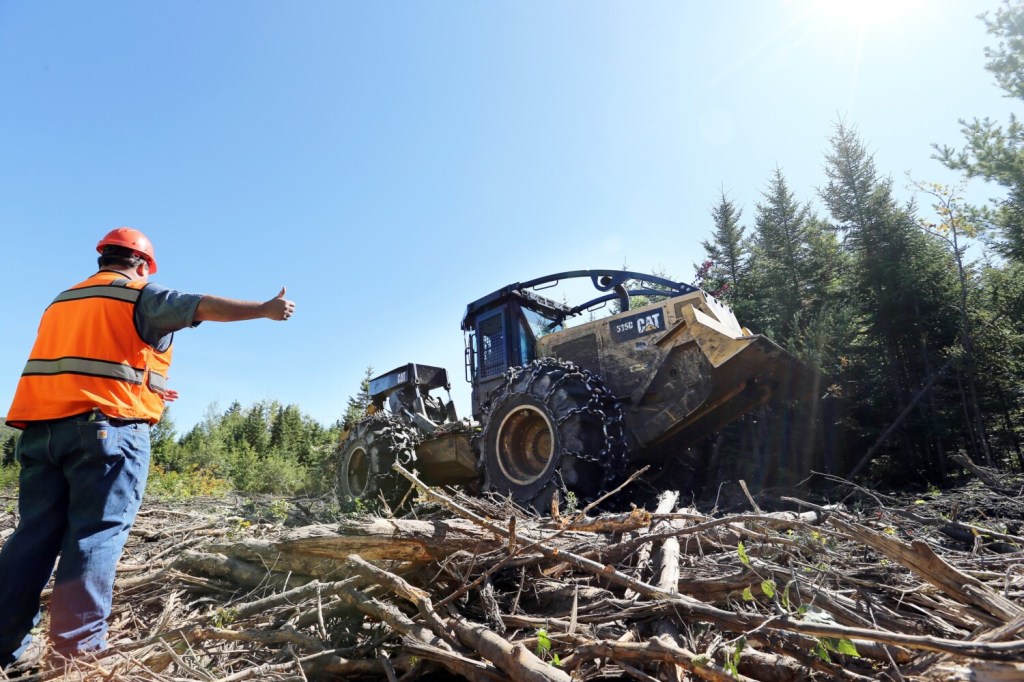COPLIN PLANTATION — With a few days of school left before graduation, these logging students aren’t out of the woods yet.
And most won’t get out of the woods afterward.
On Thursday, 15 students will complete their three-month, tuition-free course in the Maine Community College System’s mechanized logging operations program – a real-world training ground that puts them in the cockpits of sophisticated, state-of-the-art logging equipment, felling trees and cutting skid trails through the unrelentingly dense forests near Stratton. The training is so comprehensive, and the demand for skilled loggers so great, that many students have already been offered interviews and jobs.

Donald Burr, head coordinator of Maine Community College System’s mechanized logging operations program, gives a thumbs-up to a student rolling past in a grapple skidder. Ben McCanna/Staff Photographer Buy this Photo
“They’re ready right out of the gate,” said Dana Doran, executive director of Professional Logging Contractors of Maine, a trade organization that has provided the program with $5 million worth of equipment – massive machines with prosaic names like grapple skidder, feller buncher and delimber.
Doran’s group partnered with the college system, and companies like Milton CAT and Nortrax, to help Maine’s logging industry weather a tight labor market. It can cost as much as $100,000 to train a first-year employee with no prior experience.
“It’s not sustainable,” Doran said.
Tuition is free through funding from Maine Quality Centers and a Put ME to Work grant. Without funding, students would pay $15,000.
After 12 weeks of training, the graduates can expect to earn between $45,000 and $50,000 a year. Jobs are available throughout the state.
“There’s a job in this industry in every county in Maine,” Doran said. “It’s hard work. They work long hours. But if you want to stay in rural Maine, it’s a great opportunity.”
Dan Belyea, Maine Community College System’s executive director of workforce training, said the effect on students’ lives is immediate.
“It leads these guys right to a job in 12 weeks. Bam,” he said.
This latest graduating class will be the third since the program launched in 2017. The latest course received 55 applications and accepted 15. The students received a broad overview of modern mechanical systems, plus learned about timber growth, tree species, and wood products. Over the last three months, students have felled, processed and stacked about 2,500 tons of wood from privately owned land in Coplin Plantation in Franklin County. The landowner pays the community college system $20 per ton, which helps fund the program.
Free tuition is part of the draw for students.
“It’s been really nice to not have the debt of a regular college,” said Ahren Harrison, 18, of Stacyville.
On Friday, Harrison was training on a dinosauric-looking grapple skidder, dragging whole trees across the forest floor with mud flying from its tire chains. If not for the program, Harrison said he would continue cutting wood by hand with his stepfather, which he believes will be less lucrative than a job in mechanized logging.
Jessica Michalik, 25, spent the day operating an eight-wheeled harvester. Michalik had worked in logging before, driving a skidder, but through the course was able to train on a variety of machines to deepen her marketability.
Mechanized logging also evens the playing field between men and women within the industry.
“It’s pulling levers,” she said about the high-tech cockpits in which they operate. “It’s a video game. It’s not about strength.”
She said she has received a few job offers already.
Copy the Story LinkSend questions/comments to the editors.




Success. Please wait for the page to reload. If the page does not reload within 5 seconds, please refresh the page.
Enter your email and password to access comments.
Hi, to comment on stories you must . This profile is in addition to your subscription and website login.
Already have a commenting profile? .
Invalid username/password.
Please check your email to confirm and complete your registration.
Only subscribers are eligible to post comments. Please subscribe or login first for digital access. Here’s why.
Use the form below to reset your password. When you've submitted your account email, we will send an email with a reset code.